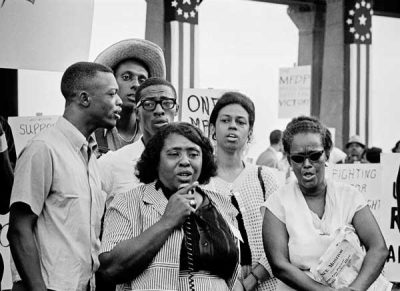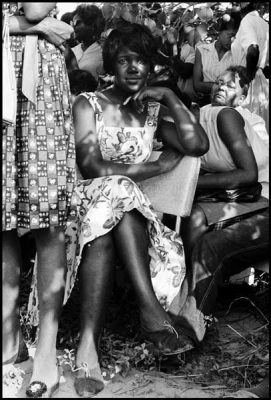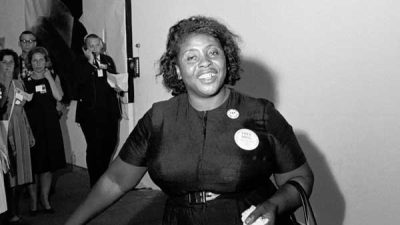As Election Day Nears, Let’s Gather Inspiration from Fannie Lou Hamer
Opinion Advocates for ideas and draws conclusions based on the author/producer’s interpretation of facts and data.
By Adam Stone
As I write these words, we’re in the homestretch of piecing together this week’s monster local election preview edition, a gigantic undertaking led over the past 16 years by Examiner Editor-in-Chief Martin Wilbur, and also fueled for more than a decade now by Deputy Editor Rick Pezzullo.
Although we produce 52 editions annually, going on the past 843 weeks, this issue is always the culmination of a year’s work, with our small but mighty team’s institutional knowledge baked into the nooks and crannies of every print and digital newspaper page.
In a sense, all of our efforts to keep residents informed, and forge community, are linked with our desire to promote healthy local democracy, and by extension encourage you to exercise your precious right to vote.
I’m obviously not breaking any new ground or issuing a bold stance in noting the dangerous ease of taking our rights for granted.

But I figured it would be useful and relevant this week to recount the story of a special American hero, the late Fannie Lou Hamer, to gain some pre-election inspiration during troubled times.
Hamer displayed astounding courage in her bruising fight for voting rights, coming within inches of her life during the bloody journey.
Her unbreakable spirit was often tested, and in especially frightening fashion following a June 9, 1963, bus ride on her way back from a Southern Christian Leadership Conference voter education workshop in Charleston, S.C.
Last week I found a radio broadcast from 1965 on Pacifica radio, with Hamer giving voice to her story.
Fannie and ‘Pap’
Hailing from Ruleville, Miss., situated in the Delta region, Hamer dared to challenge the discriminatory literacy test that many Black people were subjected to as a barrier to voting.
After she married her husband, Perry “Pap” Hamer, the couple settled in nearby Greenwood, Miss., where they lived and were actively involved in civil rights activism, particularly in their efforts to register Black voters and challenge racial discrimination.
Sharecroppers, the couple faced economic hardships and threats of violence, including the loss of their livelihood, as they actively engaged in civil rights activism.
“I was forced away from the plantation because I wouldn’t go back and withdraw, you know, my literacy test,” Hamer said in the radio segment. “After I had tried to take it, I wouldn’t go back, and I had to leave. And my husband was forced to stay on this plantation until after the harvest season was over.”
In the broadcast, Hamer described her life-changing bus stop experience, and the horrifying and relentless violence inflicted upon her and her fellow activists subsequently at a county jailhouse.
She had been returning on a Trailways bus together with about nine other Black people.
‘Get Out of Here’
On their way back to Greenwood, the bus had stopped in the city of Winona, Miss. for several of the riders to get food and use the bathroom.
They arrived at the Winona station at about noon, and four of them entered a lunchroom where Black people were barred from entry. Hamer remained on the bus.
After sitting down at the counter, a waitress wadded up some paper and threw it at the wall.
“I can’t take no more,” the waitress said, according to a sworn legal affidavit from another victim I found online.
By this time Winona city police and highway patrol entered the back of the room, tapped the diners on the shoulders with billy clubs and instructed them to leave.
But one of the activists mentioned the Interstate Commerce Commission, and its policies against discrimination. Just a month earlier, a court had ruled that the City of Jackson, Miss. violated the law by maintaining and enforcing racial segregation in terminal facilities.
“Ain’t no damn law, get up and get out of here,” an officer snapped back.
Chaos ensued.
‘They Would Tell Me to Hush’
State highway patrol and local police confronted the passengers, demanding they disembark.
An officer arrested Hamer, then 45 years old.
“And when he opened the door and I went to get in the car, he kicked me,” she said. “And they carried me on down to the county jail where the other highway patrolman had carried the other five.”
Hamer was cursed at mercilessly.
“They would ask me questions,” she remembered. “And when I would try to answer, they would tell me to hush.”
When Hamer was brought inside the booking room, she saw violence begin to unfold. One of the police officers jumped on one of the other activists.
They were then locked up.
“And after I was put in this cell, I could just hear some horrible screams and horrible sounds of licks,” she said. “And I saw one of the girls (who) was 15 years old (who) was with us, and she passed my cell and she was real bloody.”
Mercy

Hamer described a harrowing incident related to another young woman’s refusal to say “sir” after being tormented with the N-word and other physical and mental abuse.
The woman, Annell Ponder, had started to tell the officers and other men present “that we wanted them to understand that we didn’t hate them.”
An officer then said he wanted to hear her say yes, sir.
I found a sworn affidavit that Ponder had given regarding the police brutality in Winona.
“I ignored him,” she stated in the affidavit. “Another young man in a crew cut said: ‘You just came up here to stir up trouble.’ The man slapped me in the head with his fist. Then the officer in blue uniform hit me.”
The highway patrolman wanted to know why she took down his license plate number. She told him she wanted to prepare an accurate report if there was trouble. The local official then asked where she’d turn. She told him the federal government.
“They said: ‘Who do you mean, (Attorney General) Bobby Kennedy?’ and there was contempt in their voices,” Ponder explained. “I said: ‘No, the federal government.’ Then they started again insisting I say ‘sir.’ Through all this conversation (they) kept hitting me.”
Hamer listened to her friend get savagely beaten.
“And I would hear when she would hit the floor again,” Hamer said of Ponder. “And finally she began to pray. She asked God to have mercy on these people because they didn’t know what they was doing.”
Ponder, a 31-year-old from Georgia, had graduated from Atlanta’s Clark College in 1955, and worked as a teacher and librarian while also spending free time addressing voter suppression efforts.
“And one of her eyes looked like blood and her hair was standing up on her head and her clothes had been torn from the shoulder down to the waist,” Hamer recalled about her friend.
It’s painful to read Ponder’s description of the vicious beating she endured.
“At one point,” the young woman testified in the affidavit, “the highway patrolman hit me in the stomach.”
Ponder, who died in 2013, also noted in the affidavit how officers deposited her in a maximum security cell after the beating.
“One of my teeth had been chipped and my lip was bleeding, and later when I tried to walk, I staggered and fell,” she explained.
Blackjack
As for Hamer, an officer ultimately made a phone call and learned of her civil rights history of registering voters in Ruleville, and then told her: “We gonna make you wish you was dead.”
Officers led Hamer out of her cell and into another cell, and gave a prisoner a blackjack, a small hand-held club.
An officer then ordered her to lay down on a bunk bed, and demanded that the Black prisoner beat Hamer with the weapon.
“Because if you don’t,” the officer told the Black prisoner, “you know what I’ll do for you.”
Hamer then laid down on the bed as she was ordered.
“And the first Negro beat me,” she said in the radio broadcast. “He beat me until he was exalted. And after he beat me, the state highway patrolman ordered (a) second Negro to take (the) blackjack.”
Hamer’s feet moved during the drubbing so the state highway patrolman ordered the first Black prisoner to “set on my feet while the second one beat” (me).
“And,” she explains, “I just began to scream…I couldn’t control it. And then the white man got up and began to beat me in my head.”
Hamer nearly died.
She apparently lost consciousness at one point. When came came to she overheard the officers in conversation.
“We could put them SOBs in (the) Big Black (River) and nobody would ever find them,” she heard an officer assert.
‘Every Evidence in the World’

The emotional and physical scars stayed with Hamer for the rest of her life, until she died in 1977.
“I have a blood clot now in the outer to the left eye and a permanent kidney injury on the right side from that beating,” Hamer said in the 1965 radio broadcast. “These are the things that we go through in the state of Mississippi, just trying to be treated like a human being.”
Unsurprisingly, the officers were never convicted.
The Justice Department had brought action against five of the officials, and gathered strong legal proof.
“We had flew to Washington, D.C. and had the pictures made, and they had the pictures today of what happened to us in that jail,” Hamer said.
Authorities possessed not just photographic evidence of victim injuries, but also secured witnesses, such as the bus driver, waitresses from the Winona restaurant and the Black prisoners who carried out the beatings.
“They had their trial in Oxford and they had every evidence in the world, if it ever was going to be any people convicted,” Hamer lamented.
Times They Are A-Changin’
As we now know, the 1960s marked a turning point in the fight for voting rights, and Hamer was one of the activists at the forefront.
Her involvement in the Mississippi Freedom Democratic Party, founded in 1964 to challenge the delegation representing Mississippi at the Democratic National Convention, exemplified her dedication.
A century after enslaved people were emancipated, and the year after surviving the jailhouse torture, Hamer and her fellow activists refused to accept a delegation without any Black people.
“We was offered two votes at large as a compromise in the convention,” she said “but after 100 years, we wouldn’t accept a compromise because it didn’t mean anything to 63,000 people at that time was registered with the Freedom Democrat party, so we didn’t compromise.”
Hamer’s experience, and change that’s followed, underscores the woke left’s stubborn refusal to acknowledge the remarkable progress of the past six decades while also serving as an indictment of the talk radio-inspired right’s dishonest refusal to acknowledge the ongoing need for more positive change.
Neither camp seems willing to look honestly at the world as it is in 2023, and instead chooses to view all events through a narrow, distorted ideological lens.
However, just last year, in a sign of progress, June 9 became known as “Fannie Lou Hamer Day” in Winona, Miss., as voted by the local Board of Aldermen, an unthinkable consideration in 1963. In fact, as long ago as the early 1970s, the community started to honor Hamer with various tributes.
“They were tortured in those jail cells,” Hamer’s last surviving daughter, Jacqueline Hamer-Flakes, stated last June, before dying in March of this year. “It’s not easy knowing that my mother was brutally beaten in that jail. It’s not easy knowing that they really disgraced her, not allowing her to keep her dress down when she tried to smooth it back down when they were beating her on her legs.”
In 1964, Hamer even ran for a seat in the U.S. House of Representatives as the Mississippi Freedom Democratic Party candidate but lost to veteran Rep. Jamie Whitten in a primary.
Wokeism vs. Activism
So what’s the difference between woke activism and credible contemporary advocacy, at least in my view?
Woke is complaining from your couch on Facebook if journalists don’t capitalize the letter ‘B’ in Black, although it is now Associated Press style.
Real activism is pushing for the U.S. Supreme Court to ban racial gerrymandering and uphold the Voting Rights Act, as it did in fact rule in a surprise June decision involving a case out of Alabama.
Woke advocacy screams about LGBTQ rights in America, but neglects to say a damn word about repressive regimes in the Middle East, even though the U.S. and Israel, imperfect as they are, remain infinitely more enlightened than the human rights violating governments the far left blindly embraces.
(For example, on the human rights front, in wide swaths of the Middle East, outside Israel, LGBTQ people risk execution for homosexual activity, and women can be stoned to death for alleged adultery. Hamas specifically has slayed its own commanders following allegations of gay sex.)
Mature activism is fighting against hateful laws designed to divide us, distract us and win brownie points from the conservative commentariat instead of solve problems, such as the GOP’s bizarre legislative fetish about which toilet bowls and urinals people should be permitted to use.
(By the way, quick news flash, ditto heads: You’ve been relieving yourself next to trans people in public bathrooms all your life without incident, whether you know it or not.)
Binary Choices
It’s easy to feel disillusioned right now, given the woke left’s willful ignorance regarding the nature of the Oct. 7 antisemitic terrorist massacre, while the talk radio right tragically champions the status quo in the assault weapons debate, set against the uniquely American backdrop of regular mass shootings.
But “a pox on both their houses” and retreat is the very worst response.
Now, as much as ever, the world needs you to pick the leaders you believe display the strongest character. To pick the people you favor in fights over values, even if picking between imperfect choices.
It’s obviously not like the world had just hunky-dory candidates to choose from in 1963.
Progress didn’t come as a result of work performed by the perfect leaders of yesteryear.
Instead, it came from profoundly flawed political actors pushing us toward progress, slowly but surely, marked with plenty of wrong turns and steps backwards.
The messy nature of democracy, and our sorry state of current affairs, is all the more reason to cast your ballot.
Your job is to nudge us slightly closer to your view of a more perfect union with your choices, even when the choices are unpleasant.
Rock the Vote
Despite the world’s current darkness, it’s incredible to consider the progress we’ve achieved since Hamer’s day, a blink of a historical eye ago.
Even when it’s about the most mundane local issues, choosing the right leaders matters, and matters deeply.
Yes, we can all get tired, and the exhaustion is eminently understandable.
In fact, Hamer’s most famous quote captured that feeling beautifully in 1964 while at the Williams Institutional CME Church in Harlem.
“I’m sick and tired of being sick and tired,” she eloquently said, a refrain she repeated throughout the years.
But if Hamer could rally despite all she endured, so can we.
Our American heroes — in military battles and in city street marches — sacrificed their blood and their tears for our rights.
Please go vote, and vote thoughtfully.

Adam has worked in the local news industry for the past two decades in Westchester County and the broader Hudson Valley. Read more from Adam’s author bio here.
